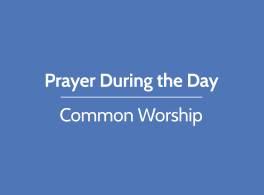The Sixth Sunday after Trinity
The Collect
O God, who hast prepared for them that love thee such good things as pass man's understanding: Pour into our hearts such love toward thee, that we, loving thee above all things, may obtain thy promises, which exceed all that we can desire; through Jesus Christ our Lord. Amen.
The Epistle
Romans 6.3-11
Know ye not that so many of us as were baptized into Jesus Christ were baptized into his death? Therefore we are buried with him by baptism into death; that like as Christ was raised up from the dead by the glory of the Father, even so we also should walk in newness of life. For if we have been planted together in the likeness of his death, we shall be also in the likeness of his resurrection: knowing this, that our old man is crucified with him, that the body of sin might be destroyed, that henceforth we should not serve sin. For he that is dead is freed from sin. Now if we be dead with Christ, we believe that we shall also live with him; knowing that Christ being raised from the dead dieth no more; death hath no more dominion over him. For in that he died, he died unto sin once; but in that he liveth, he liveth unto God. Likewise reckon ye also yourselves to be dead indeed unto sin, but alive unto God through Jesus Christ our Lord.
The Gospel
St. Matthew 5.20-26
Jesus said unto his disciples, Except your righteousness shall exceed the righteousness of the Scribes and Pharisees, ye shall in no case enter into the kingdom of heaven. Ye have heard that it was said by them of old time, Thou shalt not kill: and whosoever shall kill, shall be in danger of the judgement. But I say unto you, that whosoever is angry with his brother without a cause shall be in danger of the judgement: and whosoever shall say to his brother, Raca, shall be in danger of the council: but whosoever shall say, Thou fool, shall be in danger of hell-fire. Therefore if thou bring thy gift to the altar, and there rememberest that thy brother hath ought against thee; leave there thy gift before the altar, and go thy way, first be reconciled to thy brother, and then come and offer thy gift. Agree with thine adversary quickly, whiles thou art in the way with him; lest at any time the adversary deliver thee to the judge, and the judge deliver thee to the officer, and thou be cast into prison. Verily I say unto thee, Thou shalt by no means come out thence, till thou hast paid the uttermost farthing.
Text from The Book of Common Prayer, the rights in which are vested in the Crown,
is reproduced by permission of the Crown's Patentee, Cambridge University Press.

